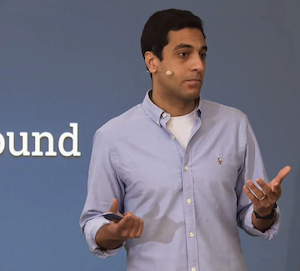 Many people consider disagreement polarizing and uncomfortable, but it doesn't have to be. The open source way calls for sharing ideas and diverse perspectives, which means that differences of opinion are not only inevitable; they're encouraged. Through my journey, I have found that open leaders nurture environments where productive disagreements can be a unifying, rather than divisive, force.
Many people consider disagreement polarizing and uncomfortable, but it doesn't have to be. The open source way calls for sharing ideas and diverse perspectives, which means that differences of opinion are not only inevitable; they're encouraged. Through my journey, I have found that open leaders nurture environments where productive disagreements can be a unifying, rather than divisive, force.
open culture
See the following -
3 Key Open Source Challenges in Developing Countries
 When I go back home and talk to people in the tech industry, or any other industry for that matter, about what I do and the topics I'm involved in daily, I'm usually met with bemusement at the idea of an Open Source Programs Office (OSPO). The concept of a company contributing to an open source project without obvious immediate financial benefit can be culturally strange to understand or explain. As someone born and raised in a country that has been trying to develop for quite some time, I understand and relate to that. There was a point in time when my only understanding of open source was that it was software that I could use without paying and without needing to wait for a specific issue or additional feature to be released. I could just do whatever I needed myself, locally. Open source faces many struggles in developing countries that make how it's perceived and its associations inaccurate and out of touch. I will discuss these struggles in this article.
When I go back home and talk to people in the tech industry, or any other industry for that matter, about what I do and the topics I'm involved in daily, I'm usually met with bemusement at the idea of an Open Source Programs Office (OSPO). The concept of a company contributing to an open source project without obvious immediate financial benefit can be culturally strange to understand or explain. As someone born and raised in a country that has been trying to develop for quite some time, I understand and relate to that. There was a point in time when my only understanding of open source was that it was software that I could use without paying and without needing to wait for a specific issue or additional feature to be released. I could just do whatever I needed myself, locally. Open source faces many struggles in developing countries that make how it's perceived and its associations inaccurate and out of touch. I will discuss these struggles in this article.
- Login to post comments
Elevating Open Leaders By Getting Out Of Their Way
 Today, we're seeing the rapid rise of agile organizations capable of quickly and effectively adapting to market new ideas with large-scale impacts. These companies tend to have something in common: they have a clear core direction and young, energetic leaders-leaders who encourage their talented employees to develop their potential. The way these organizations apply open principles to developing their internal talent-that is, how they facilitate and encourage talented employees to develop and advance in all layers of the organization-is a critical component of their sustainability and success. The organizations have achieved an important kind of "flow," through which talented employees can easily shift to the places in the organization where they can add the most value based on their talents, skills, and intrinsic motivators. Flow ensures fresh ideas and new impulses. After all, the best idea can originate anywhere in the organization-no matter where a particular employee may be located.
Today, we're seeing the rapid rise of agile organizations capable of quickly and effectively adapting to market new ideas with large-scale impacts. These companies tend to have something in common: they have a clear core direction and young, energetic leaders-leaders who encourage their talented employees to develop their potential. The way these organizations apply open principles to developing their internal talent-that is, how they facilitate and encourage talented employees to develop and advance in all layers of the organization-is a critical component of their sustainability and success. The organizations have achieved an important kind of "flow," through which talented employees can easily shift to the places in the organization where they can add the most value based on their talents, skills, and intrinsic motivators. Flow ensures fresh ideas and new impulses. After all, the best idea can originate anywhere in the organization-no matter where a particular employee may be located.
- Login to post comments
Getting started as a GitLab contributor
 GitLab's open culture is one of its strongest assets and the main reason I use GitLab in DevOps transformations. The community edition's code is open source and the paid version makes its source code available for contributions. These are valuable factors rooted in the company culture its CEO has diligently maintained over the years. It doesn't hurt that its tools are great, too. I believe GitLab's sales and marketing team is the best of any company out there. They have included me as a user, customer, and friend over the last few years, and they are genuine and caring people. This was underscored last year when I wanted to contribute a feature, and GitLab's team went to extraordinary lengths to help me succeed. Here's the story of making my first contribution to GitLab.
GitLab's open culture is one of its strongest assets and the main reason I use GitLab in DevOps transformations. The community edition's code is open source and the paid version makes its source code available for contributions. These are valuable factors rooted in the company culture its CEO has diligently maintained over the years. It doesn't hurt that its tools are great, too. I believe GitLab's sales and marketing team is the best of any company out there. They have included me as a user, customer, and friend over the last few years, and they are genuine and caring people. This was underscored last year when I wanted to contribute a feature, and GitLab's team went to extraordinary lengths to help me succeed. Here's the story of making my first contribution to GitLab.
- Login to post comments
How Disagreement Creates Unity In Open Source
- Login to post comments
Open Data Leaders in Government Finally Have a Support Network – Each Other
 New Zealand’s Open Government Data Programme Leader, Paul Stone, reflects on his time at the Open Data Leaders Network: what he learnt, who he met and how peer-learning has helped him find better solutions to problems. There are support networks for many professions that people can get involved with or lean on for support. Lawyers, accountants, IT, information management, policy making – you name it, there will be a local network out there for you to join...
New Zealand’s Open Government Data Programme Leader, Paul Stone, reflects on his time at the Open Data Leaders Network: what he learnt, who he met and how peer-learning has helped him find better solutions to problems. There are support networks for many professions that people can get involved with or lean on for support. Lawyers, accountants, IT, information management, policy making – you name it, there will be a local network out there for you to join...
- Login to post comments
Optimal Flow: Building Open Organizations Where Leaders Can Emerge
 Previously in this series on open organizations and talent management, I've discussed the importance of cultivating an organization's open leaders by getting out of their way and letting them flourish. As someone invested in developing your organization's next generation of leaders, know that your goal here isn't to be entirely "hands off"; instead, your goal is to spend time building the systems and processes that help new leaders find their footing and unleash their passion. The truth is that leadership talent rarely develops on its own. Building these systems and processes is critical during your open organization's hybrid phase. In this article, I'll discuss what that means and why it's so important. I'll also offer a few crucial questions you should be asking yourself as you nurture talent during this phase of your organization's transformation.
Previously in this series on open organizations and talent management, I've discussed the importance of cultivating an organization's open leaders by getting out of their way and letting them flourish. As someone invested in developing your organization's next generation of leaders, know that your goal here isn't to be entirely "hands off"; instead, your goal is to spend time building the systems and processes that help new leaders find their footing and unleash their passion. The truth is that leadership talent rarely develops on its own. Building these systems and processes is critical during your open organization's hybrid phase. In this article, I'll discuss what that means and why it's so important. I'll also offer a few crucial questions you should be asking yourself as you nurture talent during this phase of your organization's transformation.
- Login to post comments
To Nurture Open Leaders, Managers Must Learn To Let Go
 In my previous article on talent development in open organizations, I explained how senior and upper-level managers can help young leadership talent develop without taking an entirely "hands off" approach. The truth is that leadership talent rarely develops on its own, and if organizations wishing to become more open want to see open leaders thrive, upper management has a specific job to do. It must create balance-not only between the organization's conventional management principles and more open ones, but also (as I've explained before) between reason and feeling, head and heart. In other words, this involves creating a balance between individual ego and collective needs. These are the primary conditions for getting the entire organization moving in an open direction.
In my previous article on talent development in open organizations, I explained how senior and upper-level managers can help young leadership talent develop without taking an entirely "hands off" approach. The truth is that leadership talent rarely develops on its own, and if organizations wishing to become more open want to see open leaders thrive, upper management has a specific job to do. It must create balance-not only between the organization's conventional management principles and more open ones, but also (as I've explained before) between reason and feeling, head and heart. In other words, this involves creating a balance between individual ego and collective needs. These are the primary conditions for getting the entire organization moving in an open direction.
- Login to post comments
What Next-Generation Leaders Expect: The Choice To Work Openly
 Earlier in this series on talent management, I argued that emerging, talented leaders need space to flow to those places in the organization where they add value based on their unique talents and intrinsic motivations. If the organization's management and senior management set the right examples, extend trust, and listen, they can greatly accelerate the organization's transformation to a more open culture. But talent needs access to an organization's cliques and inner circles, its boards and executive teams, to really kickstart the kind of collaboration and mutual learning that will move the organization forward and create sustainable succession.
Earlier in this series on talent management, I argued that emerging, talented leaders need space to flow to those places in the organization where they add value based on their unique talents and intrinsic motivations. If the organization's management and senior management set the right examples, extend trust, and listen, they can greatly accelerate the organization's transformation to a more open culture. But talent needs access to an organization's cliques and inner circles, its boards and executive teams, to really kickstart the kind of collaboration and mutual learning that will move the organization forward and create sustainable succession.
- Login to post comments